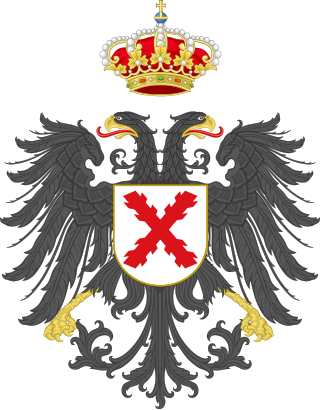
Carlism is a Traditionalist and Legitimist political movement in Spain aimed at establishing an alternative branch of the Bourbon dynasty, one descended from Don Carlos, Count of Molina (1788–1855), on the Spanish throne.

The Carlist Wars were a series of civil wars that took place in Spain during the 19th century. The contenders fought over claims to the throne, although some political differences also existed. Several times during the period from 1833 to 1876 the Carlists—followers of Don Carlos (1788–1855), an infante, and of his descendants—rallied to the cry of "God, Country, and King" and fought for the cause of Spanish tradition against liberalism, and later the republicanism, of the Spanish governments of the day. The Carlist Wars had a strong regional component, given that the new order called into question region-specific law arrangements and customs kept for centuries.

Fuero, Fur, Foro or Foru is a Spanish legal term and concept. The word comes from Latin forum, an open space used as a market, tribunal and meeting place. The same Latin root is the origin of the French terms for and foire, and the Portuguese terms foro and foral; all of these words have related, but somewhat different meanings.

Baldomero Fernández-Espartero y Álvarez de Toro was a Spanish marshal and statesman. He served as the Regent of the Realm, three times as Prime Minister and briefly as President of the Congress of Deputies. Throughout his life, he was endowed with a long list of titles such as Prince of Vergara, Duke of la Victoria, Count of Luchana, Viscount of Banderas and was also styled as "the Peacemaker".

The First Carlist War was a civil war in Spain from 1833 to 1840, the first of three Carlist Wars. It was fought between two factions over the succession to the throne and the nature of the Spanish monarchy: the conservative and devolutionist supporters of the late king's brother, Carlos de Borbón, became known as Carlists (carlistas), while the progressive and centralist supporters of the regent, Maria Christina, acting for Isabella II of Spain, were called Liberals (liberales), cristinos or isabelinos. Aside from being a war of succession about the question who the rightful successor to King Ferdinand VII of Spain was, the Carlists' goal was the return to a traditional monarchy, while the Liberals sought to defend the constitutional monarchy.

Fausto de Elhuyar was a Spanish chemist, and the first to isolate tungsten with his brother Juan José Elhuyar in 1783. He was in charge, under a King of Spain commission, of organizing the School of Mines in México City and so was responsible for building the Palacio de Minería, a structure that would house the school. Elhuyar left Mexico after the Mexican War of Independence, when most of the Spanish residents in Mexico were expelled.

Azpeitia is a town and municipality within the province of Gipuzkoa, in the Basque Country, Spain, located on the Urola river a few kilometres east of Azkoitia. Its population is 14,580. It is located 41 kilometres southwest of Donostia/San Sebastián.

Estella (Spanish) or Lizarra (Basque) is a town located in the autonomous community of Navarre, in northern Spain. It lies south west of Pamplona, close to the border with La Rioja and Álava.

The Third Carlist War, which occurred from 1872 to 1876, was the last Carlist War in Spain. It is sometimes referred to as the "Second Carlist War", as the earlier "Second" War (1847–1849) was smaller in scale and relatively trivial in political consequence.
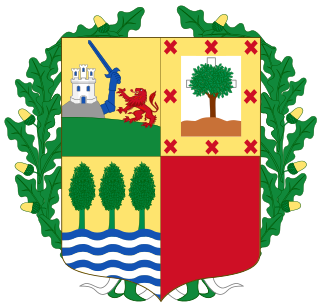
The Statute of Autonomy of the Basque Country of 1979, widely known as the Statute of Gernika, is the legal document organizing the political system of the Autonomous Community of the Basque Country' which includes the historical territories of Alava, Biscay and Gipuzkoa. It forms the region into one of the autonomous communities envisioned in the Spanish Constitution of 1978. The Statute was named "Statute of Gernika" after the city of Gernika, where its final form was approved on 29 December 1978. It was ratified by referendum on 25 October 1979, despite the abstention of more than 40% of the electorate. The statute was accepted by the lower house of the Spanish Parliament on November 29 and the Spanish Senate on December 12.

Rafael Maroto Yserns was a Spanish general, known both for his involvement on the Spanish side in the wars of independence in South America and on the Carlist side in the First Carlist War.
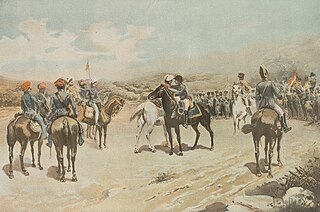
The Convention of Vergara, entered into on 31 August 1839, was a treaty successfully ending the major fighting in Spain's First Carlist War. The treaty, also known by many other names including the Embrace of Vergara, was signed by Baldomero Espartero for the Isabelines and Rafael Maroto for the Carlists.

Xavier María de Munibe e Idiáquez, Count of Peñaflorida was a Spanish writer and intellectual, known for his leading work in Enlightenment Spain and Basque literature. He founded the Royal Basque Society of Friends of the Country in Bergara in 1748, which would become the first Sociedad Económica de los Amigos del País, a society inextricably linked to the Real Compañía Guipuzcoana de Caracas.
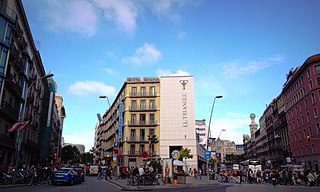
Carrer de Bergara is a short street in central Barcelona, stretching from Plaça Catalunya towards Carrer de Pelai. It's in the Eixample district. It's named after the Basque city of Bergara, where an armistice was signed at the end the First Carlist War in 1839. The name of the street was approved in 1900. The street is home to a number of restaurants, cafes, and hotels.
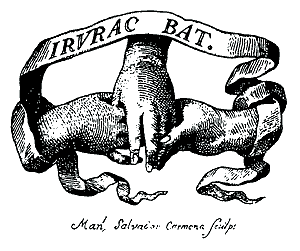
The Royal Basque Society of Friends of the Country, also known as La Bascongada or Bascongada Society, was founded in the mid-18th century to encourage the scientific, cultural and economic development of the Basque Country.
Muñagorriren bertsoak are a set of written bertsos written and published in Gipuzkoa in 1838 during the last stage of the First Carlist War. During the war various bertso leaflets were published, promoting various factions, with some enjoying wide circulation and influence over public opinion across Basque language areas, the main Carlist stronghold.

The Vergara family is one of the most aristocratic families of Colombia and Chile with origins in Bergara, Spain. The House of Vergara had its period of greatest influence between the 17th, 18th, and 19th centuries. The family is spread across several branches in Spain, Colombia, Chile and the US. The Vergara family is considered as one of the first families of Spaniards in the Americas that arrived first as conquistadors, then as royal officers of the Spanish crown. The Vergara Family have produced four presidents of Colombia by the same surname; and three more related by blood. Another branch is considered amongst the founding families of Chile. Originally from Gipuzkoa, Spain, more specifically from Bergara, a municipality in Basque Country.
The end of Basque home rule or fueros in Spain was a process coming to a head in the period extending from the First Carlist War (1833-1840) to the aftermath of the Third Carlist War (1876-1878). It brought to an end the status of sovereignty coupled with allegiance to the Crown of Castile held by the different Basque territories for centuries. In the French Basque Country, home rule was abruptly suppressed during the French Revolution.

Queen Isabella II of Spain was barely three years of age when her father, King Ferdinand VII, died on 29 September 1833. The years of her minority were marked first by the regency of her mother, Maria Christina of the Two Sicilies, and then under General Baldomero Espartero, covering almost the first ten years of her reign, until 23 July 1843, when Isabella was declared to be of age.






















